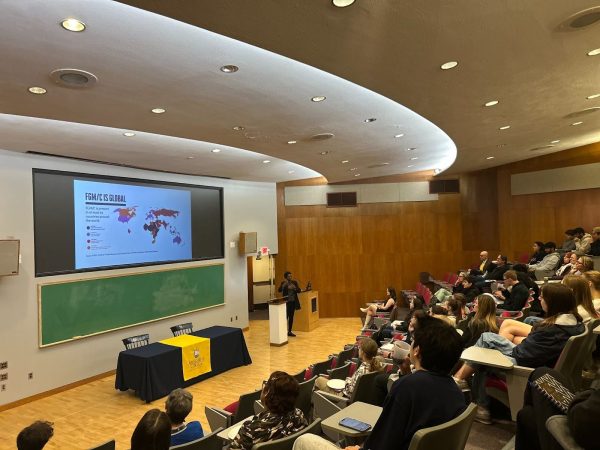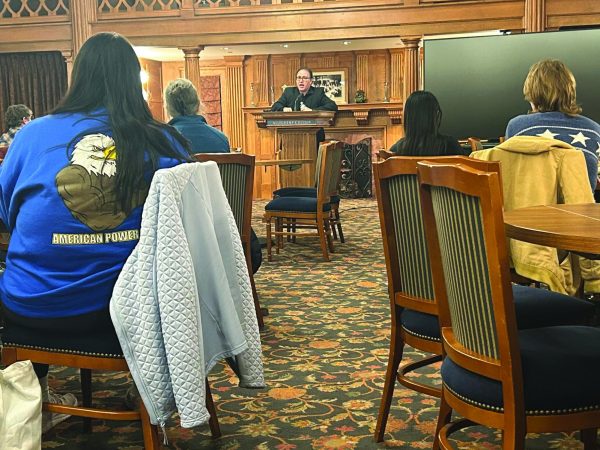Allegheny students win 2016 national letters to an elected official competition
Hayden Moyer, ’17, and Walter Stover, ’17, were one of five winning teams who competed in the National 2016 Letters to an Elected Official competition sponsored by Project Pericles. Hundreds of teams submit proposals for the competition to be judged by officials with legislative knowledge.
The Campus: What did your project in the Letters to an Elected Official competition entail?
Walter Stover: The project and competition entailed that we select a policy issue that was at a state level or a federal level. The important thing was that it was a policy issue that was relevant to people, but wasn’t currently being adequately addressed.
Campus: Where did your inspiration for this policy come from?
Stover: There was an article that I had read about this thing called “the right to be forgotten” in the European Union. There was some controversy because it was essentially requiring search engine providers to have a service or function to request articles or any other sort of media that could be found through a search engine to be inaccessible. There was a family in California and their daughter was killed in a car accident. The highway patrolmen who were on the scene leaked images of the crash online so the family who lost their daughter in the accident couldn’t go online without running into images of the scene. It was terrible for them. At present, there’s not really any recourse for this. Under the “right to be forgotten,” they would have recourse. They would go to the search engine and ask that the links be pulled down, so when people go on the internet, they just can’t find anything to do with this. Nothing like that exists in the U.S..
Campus: Who did you write to and why?
Stover: We wrote to Senator Casey in Pennsylvania. That was more Hayden’s choice. He believed that Senator Casey was a man of utmost integrity and someone he thought would be amenable to this type of proposal that we were suggesting.
Campus: What are some of the positives that could result should your idea become a reality?
Stover: People have more control over their personal information and access to that personal information on the web. Before the internet, any sort of records of who you were or events were all relatively temporary. There would be an article published and maybe some bad press, but it would fade away at some point. The internet [now] is much more permanent. Anything that happens or gets published on the web remains stored in archives for an indefinite period of time. That’s great for a lot of things. It becomes this source of knowledge that you can access with records that are stored for decades. When it comes to people’s privacy, we have to have this conversation about “should we change the rights of people and their privacy to correspond with technology?”
Campus: Are there any negatives to this policy?
Stover: You can’t arbitrarily restrict this privilege to people who need it most. There are people who would seek to abuse the system. Let’s say there was controversy over a wealthy tech executive. A tech executive probably has favor with a search engine and could say “Pull this information down. Can you try and cover this up?” It’s like the court system in America. It’s a defender of the innocent, but it can also have unexpected side effects where people who are guilty will go free. If it’s a significant story, the truth will come out. This isn’t like you’re deleting the article. It’s only making it so you can’t find it on Google.
Campus: Do you and your partner, Hayden Moyer, plan to continue conducting research on this legislation?
Stover: Absolutely. Part of the provision of this contest was that there was a monetary award. That money is specifically set aside for a project that Hayden and I had to propose based on this idea. When we won the competition, we also had to submit a project proposal that went with it. We wanted to kickstart this conversation that there was an absence of by creating a new website to advocate for this kind of conversation to happen. This website would collect cases that are relevant to what we’re talking about. People could go there and learn more about what exactly it is and how it’s feasible in the U.S. and why it’s needed.
Campus: What were your initial thoughts when you found out you won?
Stover: I found out and I was like, “Did I actually get that? Does that mean I actually have to do that project that we proposed?” I really did this because I wanted to work with Hayden, and I was interested in the concept. I wasn’t really gunning to get a winning spot. I just thought it was something interesting to do. I was totally taken by surprise when I found out.







